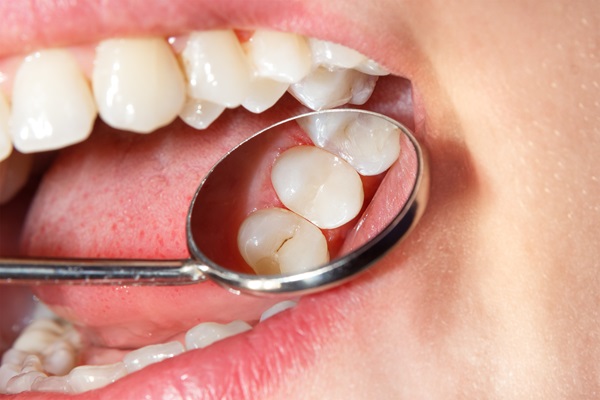Painful Dental Abscess [Dental Emergency]

A dental abscess can be a painful dental emergency requiring immediate attention and rigorous follow-up care. Read on to learn more about the causes and symptoms of a dental abscess and what to do in the event than an abscess strikes.
What is a dental abscess?
A dental abscess is the result of a bacterial infection in the tooth.
Untreated cavities
The infection is usually caused by an untreated dental cavity, according to the Mayo Clinic. The space created by a cavity allows germs to enter the sensitive, soft interior of the tooth and begin wreaking havoc. Many people only begin to notice that there is a problem when it is too late, and they have trouble chewing or experience intense, chronic pain in the affected tooth. Once an abscess has taken hold in a tooth, the pain it causes can radiate all the way to the ear or chin. Left untreated, an abscess can even become a life-threatening condition.
Symptoms of an abscess
When it is a dental emergency, an abscess produces some very clear symptoms in the mouth. The most notable symptoms as defined by Healthline are the pus, or discharge, that develops inside the tooth, along with swelling, pain and a foul taste in the mouth. Other common symptoms of a dental abscess include bad breath and increased pain while eating and drinking.
In advanced cases, a dental abscess may have spread its bacteria to other parts of the body when a sufferer swallows the pus created, leading to fever and swelling in the lymph nodes. These advanced cases may also lead to difficulty swallowing or breathing, which are signs that immediate medical attention is needed to treat the infection.
How to get help
Once a dental abscess is noticed, it will require medical attention.
See a dentist
According to the NHS, treatment for an abscess can be a simple draining and cleaning of the affected tooth or full extraction of the tooth if it is beyond salvage. In some cases, an abscess can be caused by a foreign object lodged in the tooth or gums. In these situations, the object must be removed and the area cleaned. Oftentimes, a dentist will also place a cap or crown on the affected tooth to protect it from further infection and to restore its aesthetic appearance in the mouth. A dentist will also talk with the patient about how to prevent an abscess from occurring again in the future through methods like regular brushing and flossing and biannual dental checkups to catch problems with teeth before they worsen.
Visit the hospital
Not all abscesses can wait for a dental appointment. Advanced cases can create symptoms like shortness of breath, difficulty swallowing and fever. These are signs that the infection has spread to other parts of the body and that medical attention is needed as soon as possible.
At the emergency room, doctors will examine the abscess and remove any foreign objects from the tooth, if present. They will also stabilize the patient’s vital signs and begin a regimen of antibiotics to slow down and eventually eliminate the infection. After the patient is discharged, the doctor will also refer them to see a dentist as soon as possible for the affected tooth to be repaired and protected from further infection.
Need help with a dental abscess?
An abscess may constitute a dental emergency. If there are any signs of infection, medical treatment should be promptly sought.
Request an appointment here: https://totalcareimplantdentistry.com or call Total Care Implant Dentistry at (760) 394-3088 for an appointment in our Palm Desert office.
Check out what others are saying about our services on Yelp: Read our Yelp reviews.
Recent Posts
Think you might need a dental filling? Read on to learn more about this treatment. Tooth decay is one of the most common oral health conditions. When untreated, it can result in serious dental problems including tooth loss. Dental fillings restore the structure and function of the affected teeth. Knowing the importance of dental fillings…
You may have a basic understanding of the differences between general dentistry and an emergency dentistry office. Still, it can be difficult to determine which to visit when you have an oral health concern. This resource provides you with the information you need to make informed decisions about your oral care, particularly whether to visit…
Many emergency dentistry situations require dental extractions. Removing the problematic tooth can improve your dental health. It can even prevent further complications.If patients want to know the importance of dental extractions during an emergency dental treatment, here are the details.A dental fracture can happen if the patient bites down hard enough to crack the lower…
You may require emergency dentistry services if you experience severe discomfort, severe bleeding, tooth damage, swollen gums, or extreme tooth sensitivity. If one or more of these symptoms exist, you should contact a local dentist offering emergency services to find the appropriate action to take.The following reviews the most common signs that indicate a dental…


